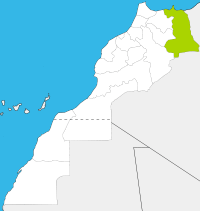Jerada
| Jerada ⵊⵔⴰⴷⴰ جرادة | |
|---|---|
 Jerada Location in Morocco | |
| Coordinates: 34°18′42″N 2°9′49″W / 34.31167°N 2.16361°WCoordinates: 34°18′42″N 2°9′49″W / 34.31167°N 2.16361°W | |
| Country |
|
| Region | Oriental |
| Population (2004) | |
| • Total | 60 000 |
| Time zone | WET (UTC+0) |
| • Summer (DST) | WEST (UTC+1) |
Jerada (Berber: ⵊⵔⴰⴷⴰ, Arabic: جرادة, Jrada) is a town in northeastern Morocco, in the Oriental region of the country. It is located close to the border with Algeria. It has approx. 30,000 inhabitants.
The 1948 Anti-Jewish Riots in Oujda and Jerada[1] occurred in this city where the Jewish population, consisting of about a hundred souls, had been surrounded by an uncontrollable mob and attacked with outrageous savagery. Neither children nor old men were spared; thirty-nine Jews lost their lives, thirty were severely injured and others less severely so.[2]
References
- ↑ Andrew G. Bostom (2008). The legacy of Islamic antisemitism: from sacred texts to solemn history. Prometheus Books. p. 160. Retrieved 6 March 2011.
- ↑ Dalit Atrakchi (2001). "The Moroccan Nationalist Movement and Its Attitude toward Jews and Zionism". In Michael M. Laskier and Yaacov Lev. The Divergence of Judaism and Islam. University Press of Florida. p. 163.: "...the riots that broke out on 7 June 1948 in the cities of Oujda and Jerada, close to the border between Morocco and Algeria, which served as a transfer station for Moroccan Jews on their way to Israel... It is believed that the riots were brought on by the speech given a short while earlier by Sultan Muḥammad Ben-Yussuf, which inveighed against the Zionists and cried for solidarity with the Arabs fighting in Israel. Claims have been made that the French authorities not only knew about these impending events but also goaded and collaborated with the instigators as a provocation against the heads of the Moroccan Independence Party, who could later be blamed for committing murder."
| |||||||||||||||||
